

Ready to take the leap?
THE WAG magazine
an informative, entertaining read about dogs & their companions

FALL 2017 | Volume 2 Issue 4
PUBLISHERS
Gary Lex
Penny Lex
EDITOR
Penny Lex
DESIGNER
Amy Civer
PHOTOGRAPHER
Larry Moyse
PROOFREADER
Sue Maves
SALES & MARKETING
Gary Lex
Alleasha Wright
Contributors
C.J. Anderson
Teresa Bitler
Bruce Dell, RPh, MS, DPh
Jonny Hawkins
Joyce Becker Lee

Penny Lex
Larry Moyse
Terri Schlichenmeyer
DISTRIBUTION
Times Media
Empty Bowl Pet Food Pantry/ Animals in Disaster SUBSCRIPTIONS
$24/year (4 issues) to: THE WAG magazine 14844 N. Greenhurst Ave Fountain Hills, AZ 85268
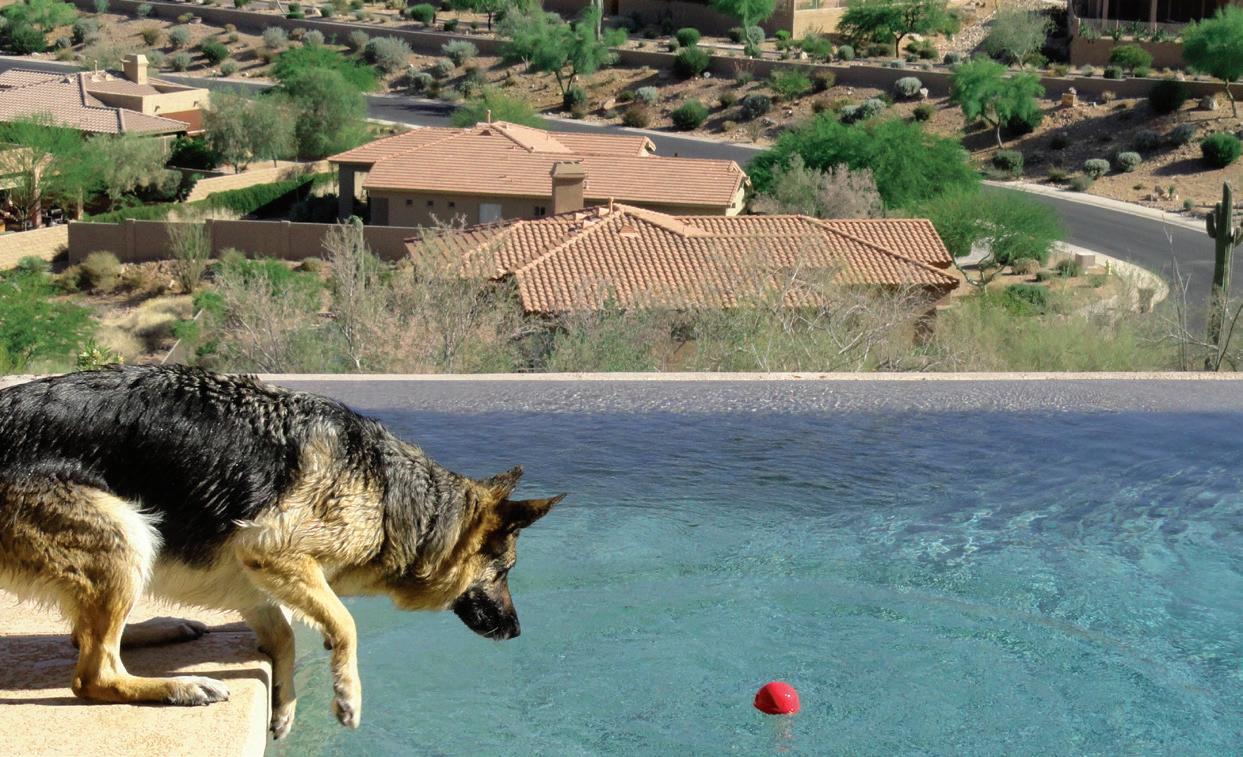
ADVERTISING INQUIRIES
Gary Lex • 715-497-8073 gary@thewagmagazine.com
Alleasha Wright • 480-689-0277 alleashawright@hotmail.com
IDEAS AND COMMENTS
Penny Lex 507-202-3929
Penny@thewagmagazine.com www.thewagmagazine.com THE
FROM THE EDITOR
As Summer ‘17 becomes a memory, Fall and the holidays are soon upon us. Topping my list of “giving thanks to” this year are all of those who work so hard and tirelessly in animal rescue and advocacy for animal rights. For toiling, often beyond their limits, to aid animals in need—“thank you.”
And, on the celebratory side, I say “Cheers.” Cheers to the strides that’ve been made about dogs in our society. We’re finally seeing more and more acknowledgment of canine contributions—in the military, law enforcement, medicine, and in our lives in general. If you take a moment and reflect over the past 20–30 years and how dogs were viewed in our culture back then, the positive contrast is quite evident. There’s still a ways to go, however, to get these beloved creatures the treatment, rights, and credit they so deserve. Moving on. Let’s talk about disaster preparedness. OK, are you tempted to skip this article? Please don’t. While it might not be the most riveting subject to read about, it’s extremely educational and could mean the difference between life and death for you and your pet. In this issue, C.J. Anderson has addressed earthquakes and provided a plethora of information on the subject. Regardless of where you live, there’s no immunity to environmental disasters. And while we have no control over what Mother Nature decides to do, we can be knowledgeable in being prepared and knowing the best practices to protect ourselves and our pets.
In the Summer issue, Teresa Bitler wrote about becoming a veterinarian. Here, she addresses the veterinarian’s right-hand assistant—the veterinary technician. Read about what it takes to become a vet tech, the tasks they perform, and the opportunities afforded the graduate student (page 12).
CHEW ON THIS—Ask Your Veterinary Pharmacist
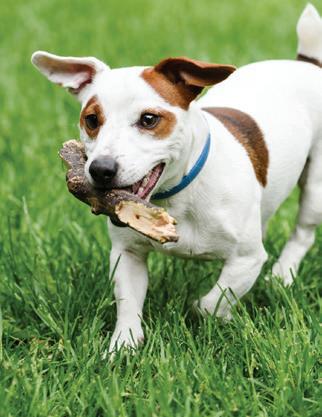
About… is the newest addition to departments in THE WAG. This issue, Bruce Dell, RPh, MS, DPh addresses the all-too-common and frequently deadly ailment of Valley Fever. Got a question or subject you’d like Bruce to address? Send us an email (penny@thewagmagazine.com).
Curl up with your best fur buddy and enjoy articles about memorializing pets, holiday hazards, an animal chaplain, adding to your pack, and much more.
Remember to send us an email with your story ideas, comments on what you’d like to see more of, and your pictures for the Smile for the Camera section.
Wishing you peace and the best of holidays, WOOF!
BRUNO’S

Sports Bar
Front door’s in back
Animal Clinic Del Rancho

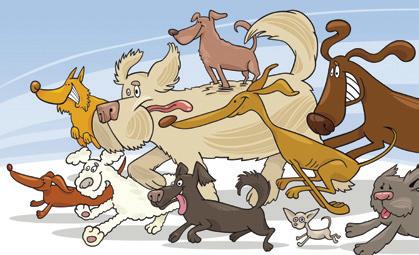
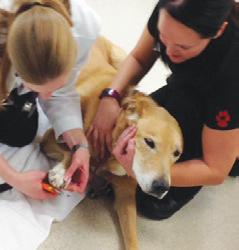
Coldwell Banker, Diana Rickenbaugh

Coldwell Banker, Karen DeGeorge
Dr. Kelly’s Mobile Surgical Unit
Georgie’s Diner Pal’s Inn Pet Resort
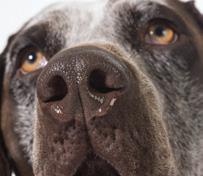
We hope you patronize ALL of our advertisers! And when you do, please mention THE WAG.
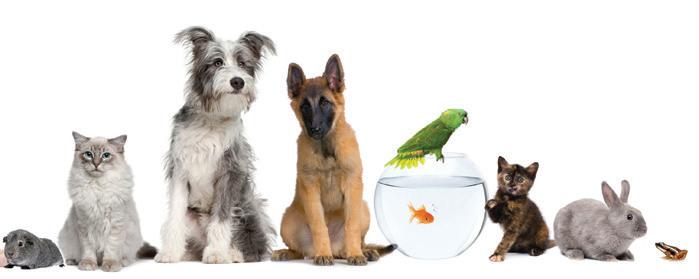
All NFL GAMES

Daily: open 11 am-2 am Happy Hour 2-6 pm
Wednesday: 11 am-11 pm
Free Pool

Saturday: 9 pm-close
Karaoke
16737 E. Parkview Ave. • Fountain Hills, AZ 85268 (480) 836-0770



Smile for the camera



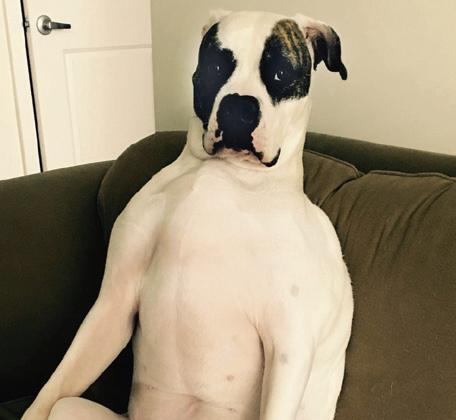
We’d Love to Hear from You!
6th Annual Arizona Week for the Animals
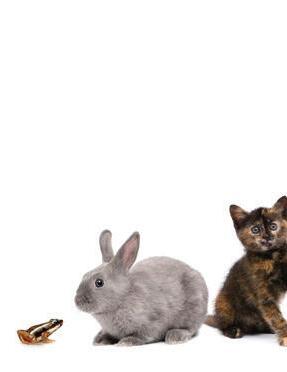











October 21-29, 2017






Celebrate the love, joy, and many blessings of animals during this week filled with activities. Shelters, rescue groups, and humane organizations will be hosting animal-related special events planned to celebrate and help animals. Enjoy adoption fairs, low cost spay-neuter events, shelter days, R.E.A.D. dog programs in libraries, donation drives, walks for the farm animals, and therapy dogs visiting hospitals and living-assisted homes. There will also be a salute to K9 military and police dogs, feral cat initiatives, educational programs at sanctuaries and conservation activities, blessings for the animals, and fun-filled festivals with food, music and amazing animals. See arizonaanimals.org Calendar of Events, more information, and details of events taking place throughout Arizona.
for

What Does A Runny Nose Mean?
 By Teresa Bitler
By Teresa Bitler
an oral-nasal fistula, a hole between the nose and mouth sometimes caused by tooth decay or injury. Surgery may be required for either.
L
ike humans, dogs occasionally get runny noses; and while usually it’s nothing to worry about, it can sometimes be the sign of something much more serious—especially if it’s chronic or the discharge is cloudy, yellow, green or bloody. In those cases, consult a veterinarian to determine the exact cause. Here’s a guide to what might be causing your dog’s nose to drip and possible treatments.
Allergies: Chronic, clear discharge is often a sign of allergies. Dogs can be allergic to pollens, foods, drugs, mites, spores, chemicals and even dander (our shed skin). Other symptoms include sneezing, coughing, itching, nosebleeds and breathing problems. If you suspect allergies, talk to your vet, who may perform an allergy test and suggest treatment with antihistamines, immunosuppressants, steroids, and biologicals.

Infection: A discharge of mucus or pus, as well as a bad odor, nosebleed, or cough could indicate a bacterial, fungal, or viral infection. Treatment depends on the cause. Bacterial infections may require several weeks of antibiotics while fungal infections usually require antifungal drugs. Surgery may be necessary.
Dental disease: Periodontitis, gingivitis, and abscessed teeth
can also cause bacterial infections that spread to your dog’s nasal cavities. In addition to antibiotics, your dog will need to undergo treatment for dental disease, such as tooth cleaning or removal.
Other diseases: Dogs suffering from Rocky Mountain spotted fever, a bacterial disease transmitted by infected fleas, may suffer from nosebleeds and require several weeks of antibiotics. Those who were not properly vaccinated as puppies and contract distemper may experience a sticky, yellow nasal discharge. Distemper treatment depends on the symptoms.
Those who were not properly vaccinated as puppies and contract distemper may experience a sticky, yellow nasal discharge.
the nose could indicate there’s something stuck in that nostril, like a blade of grass. If you can see the foreign object, you can carefully remove it with tweezers. However, if you can’t see the object or your dog won’t remain still, don’t pursue. See your veterinarian.
Polyps and tumors: Signs a discharge of blood, pus, or mucus. Dogs may also have noisy breathing, a bulge on one side of the nose, and decreased appetite. Polyps and benign tumors are usually removed surgically. Cancerous tumors are usually treated with radiation. Unfortunately, according to the National Canine Cancer Foundation, dogs with cancerous nasal tumors, even with radiation, usually only survive 8 to 19.7 months.
Nasal mites: A chronic runny nose, sneezing, and nosebleeds could also mean nasal mites, a common parasite. Most dogs are asymptomatic, but if your dog has a severe infestation, he may show signs and require an oral dose of the heartworm drug, Ivermectin.
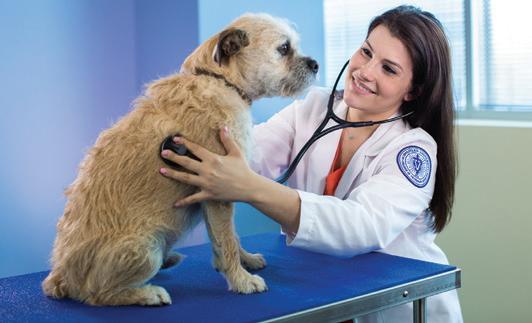
Nostril formation: Flat-faced breeds, such bulldogs and pugs, as well as dogs with soft,
floppy nose cartilage are more likely to have nasal discharge than others because of the way the nostrils and nasal passage are formed. Ask your vet whether surgery is necessary to correct it in your dog’s case.
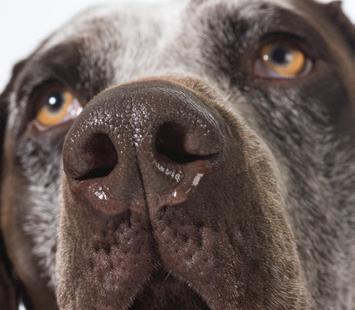
Blockage: Discharge from just one nostril along with sneezing, nosebleeds, and pawing at
Cleft palate or fistula: Nasal discharge after eating could indicate a cleft palate, an abnormal opening in the roof of your dog’s mouth caused by the two sides of his palate not properly fusing during embryonic development. In more mature dogs, it could also be a sign of
Monday: Extended Happy Hour 3pm-Close
Tuesday: 1/2 Price Bottle of Wine
Wednesday: 1/2 Price Bottle of Wine
Thursday: 1/2 Price All Desserts


Saturday: $30 Pizza & Bottle of Wine Special



Sunday: All Day Happy Hour 11am-Close

Ask Your Veterinary Pharmacist About… VALLEY FEVER IN DOGS


























 By Bruce Dell, RPh, MS, DPh
By Bruce Dell, RPh, MS, DPh
Rudy is a 4-year-old Boxer who lately seemed rundown, uninterested in once special activities, and his appetite just wasn’t what it used to be. For a few days, especially after Rudy developed a hacking cough, his parents chalked it up to allergies or dust. After a week went by, they took their fur baby to Rudy’s vet for evaluation. Many of you know where this is going—not surprisingly, Rudy was diagnosed with Valley Fever (VF). Luckily for Rudy, his parents noticed these symptoms and sought advice early and, as a result, Rudy was started on medication. He’s now back to his goofy self.
The Fungus Among Us
Valley Fever is a fungal infection that can quickly devastate a dog. The specific offending fungus is Coccidioides immitis, and Valley Fever is sometimes called coccidioidomycosis. This fungus lives in our soil and thrives in hot, desert environments in places like Arizona, Nevada, New Mexico, Utah, Texas, and California. It is also prevalent in Mexico and South and Central America. The disease is more common in the summer months and in the late fall. While we tend to think of VF as a disease of dogs and people,
it’s possible to see this in cats, horses and even wild animals. It is not transmitted from animals to humans. Since dogs are close to the ground, they are prime candidates for infection. The fragile desert crust that contains this soil fungus is disrupted by recreational vehicles, construction, and off-path hiking; our winds kick up the dust along with these fungal spores and make them more readily available for groundsniffing pups. Only inhalation of the fungal spores can cause VF; more than two thirds of the dogs that encounter the fungus successfully fight it off. These dogs show no symptoms and are likely immune from VF for the rest of their lives. Researchers predict that 6–10 percent of the dogs in Pinal, Maricopa, and Pima counties will develop VF each year.
A growing problem is VF in the dogs of our winter vacationer population. When visiting dogs begin to show symptoms upon returning to locations where veterinarians do not commonly see VF, the pets are sometimes incorrectly diagnosed.

Symptoms and Diagnosis
Symptoms vary greatly; Rudy’s were typical of early infection: cough, poor appetite, weight
loss, lack of energy and fever. If this fungus spreads throughout the body, symptoms can become much worse and include limping, swollen joints, skin abscesses, open wounds, seizures, paralysis, and eye inflammation. Clearly, pet owners have the best chance of making the greatest difference when the disease is diagnosed and treated early. Diagnosis is accomplished with a proper history of the dog’s symptoms, lab tests, and possibly x-rays. These tests can be negative, especially in the early stages, and may need to be repeated in 3–4 weeks. Most ‘positives’ come from the result of a VF cocci titer which is a measure of the dog’s level of VF antibodies. Lower titers (1:4, 1:8) are sometimes seen in dogs without VF symptoms in early stages of infection; low titers can also be seen in some dogs for the rest of their lives. In general, dogs with higher titers are considered more severe cases, although very sick dogs can have lower titers. This is why multiple tests and the pet’s history are so important.
Treatment
Treatment often involves the use of an antifungal drug like

fluconazole, itraconazole, or ketoconazole, often for 6–12 months, especially if the disease has spread; these drugs inhibit the growth of the fungus. Some dogs are on these drugs for the remainder of their lives. Pet owners should see some improvement in 4–6 weeks. I recommend a simple diary that considers the dog’s appetite, activity level, and overall behavior. At the end of each day, assess the pet based on these criteria and jot it down; this is an excellent way to see trends—good or bad. Sometimes the drug may need to be changed, sometimes the dose adjusted. Give each dose consistently; if the directions are twice a day, give it every 12 hours for consistent blood levels. These three drugs have some liver involvement; the only way to see this is with periodic liver tests. Side effects range from
minor (appetite suppression, diarrhea, vomiting) to major (skin conditions); fluconazole is, by far, the most common drug used for VF. While cures are possible, some dogs require medication forever. It is entirely possible that a dog will seem ‘cured’ but relapse later, requiring additional therapy. Be sure to ask your vet about supplements before giving them.
Less Fever in the Future?
While there is chat about a vaccine on the horizon, there are many studies underway. One involves TGEN, Translational Genomics Research Institute, that is studying genetic predisposition to VF. They’ll send test kits regardless of whether your pet is affected or not (contact them at TGen.org/VFPAWS). Also, we are fortunate to have a premier facility, the Valley Fever Center for Excellence, at UA-Tucson.
The most important things we can do as pet owners is to identify the symptoms early and partner with your veterinarian. While we can’t prevent VF, we can reduce the chances for —-infection by avoiding activities that stir up dust, discourage digging habits, and keep dogs indoors more than outdoors.

Becoming a Veterinary Technician
Fulfilling an Integral Role in Veterinary Medicine
By Teresa Bitlerdischarge instructions with owners.
Watson says her role as a vet tech is similar to what a nurse’s would be in the human medical profession and shouldn’t be confused with that of a veterinary assistant, who would complete tasks like scheduling appointments and cleaning cages.
Vet techs also have more rigorous training. Most vet techs in Arizona earn an associate’s degree in veterinary technology, pass national and state examinations, and get their licenses. Assistants, on the other hand, receive onthe-job-training or complete a six- to nine-month course to become certified.
Although vet techs do get to spend a lot of time interacting with animals, the job isn’t just “playing with puppies and kittens,” Watson says. You have to be willing to clean out cages and prepared to watch animals be euthanized.
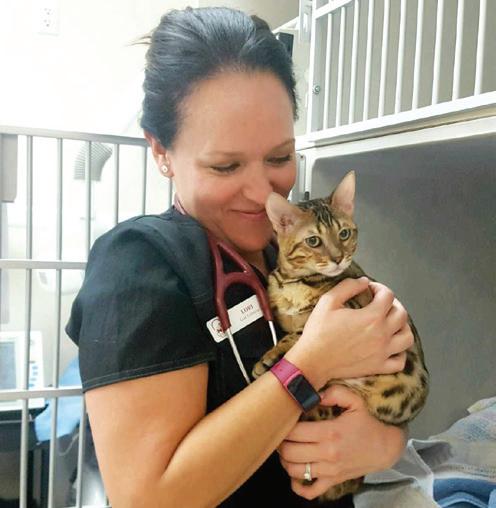
If you dream of working in veterinarian medicine but don’t want the stress and expense of veterinary school, a career as a veterinarian technician might be a good option.
Defining the Role and What It Takes
Veterinary technicians, also known as vet techs, do everything from drawing blood to assisting in surgeries. According to Lori Watson, lead vet tech at Animal Clinic Del Rancho in Scottsdale, a typical day might include administering vaccines, assisting the veterinarian during exams, and reviewing care instructions with owners. On surgery days, a vet tech might administer presurgery medications, insert IVs and catheters, assist in the actual surgery, monitor the animals post-op, and go over
Dr. Kimberly Focht, veterinary technology program director at Mesa Community College, says as a vet tech, you also need to have good coping skills because you do face heartbreaking situations, like animals being euthanatized when their owners are unable or unwilling to pay for treatment. “Compassion fatigue” is common in the industry.
You should also “be okay getting dirty” and be able to deal with people who are distraught because their pet, a member of their family, just died or who are irate because of something that happened on the way to the appointment. Coping and communication skills can be learned, Focht says, but it helps if you have them beforehand.
Education
There are five American Veterinary Medical Association-credited vet tech programs in the state: Mesa
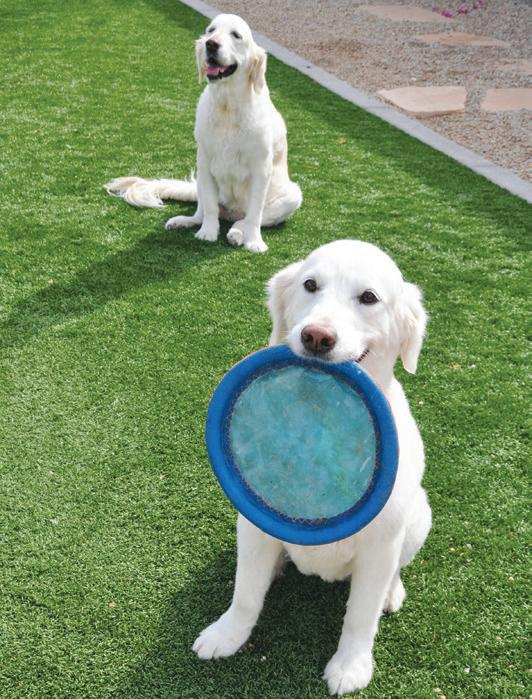
Community College (MCC), Pima Community College in Tucson, Pima Medical East Valley in Mesa, Pima Medical Institute Phoenix, and Pima Medical Institute Tucson. Depending on the program, admission can be extremely competitive. For example, MCC admits only 24 students into its program every year.
To get into MCC’s program, students need to complete prerequisite classes including biology, chemistry, and introduction to veterinary technology with a “C” or better, although Focht says recently students have needed at least a 3.0 GPA in the science prerequisites to be admitted.
supply companies, and research entities like Arizona State University and Mayo Clinic.

Starting salaries for graduates working in private clinics range from $12 to $14 per hour; those working for researchers or large companies can earn up to $16. According to the Bureau of Labor Statistics, the average salary in 2016 was $32,490 per year, or $15.62 per hour.
As a practicing veterinarian for over twenty years, I have had the opportunity to work with an array of veterinary team members. I call it a team because that is what we are, and as a group we strive to provide the best medical care for our patients. The veterinary technician is an integral part of this team. I rely on my technician to triage patients, provide accurate history, and communicate with the clients. A good technician can anticipate a veterinarian’s every need. Bottom line is I could not deliver the high-quality patient care without my technicians. ”
“

You’re never going to get rich as a vet tech, Watson admits, but that’s not why she chose this profession.
Bridget Stewart, DVM • Medical Director • Animal Clinic Del RanchoStudents also need to have at least one year of animalrelated work experience (pet sitting does not count), three signed reference letters, and be able to meet the physical requirements of the job, including lifting and carrying 40 pounds from the ground to waist level. Admission criteria will vary somewhat depending on the school and program.
Once admitted to a program, you will study animal anatomy, physiology, nursing, radiology, microbiology, anesthesia, and surgery. Expect to study approximately two hours outside of class for every hour in class or at least 15 to 20 minutes per day per class, Focht advises her students.
You will also be required to spend time caring for the program’s animals, including horses, goats, dogs, cats, rabbits, and rats, and to intern in a professional setting. At MCC, students are required to complete 360 hours of internships divided between small animal, large animal, specialty, and emergency practices.
Program costs vary depending on the school you attend. At MCC, two years in the vet tech program will currently set you back $26,000, or $13,000 per year.
But, demand is high for skilled vet techs in Arizona.
“We don’t even have a job placement service, because our students are usually hired before they graduate,” Focht says.
Rewarding Opportunities
After passing the state and national board exams and becoming a certified vet tech (CVT), most students take jobs in private clinics. Other employers include zoos, humane societies, pharmaceutical companies, veterinary
“I love taking care of animals,” she explains. “I love providing nursing care.”
If you are considering a career as a vet tech, Watson recommends shadowing one first to make sure you’re up for it. The job can be demanding and difficult, but it can also be incredibly rewarding.
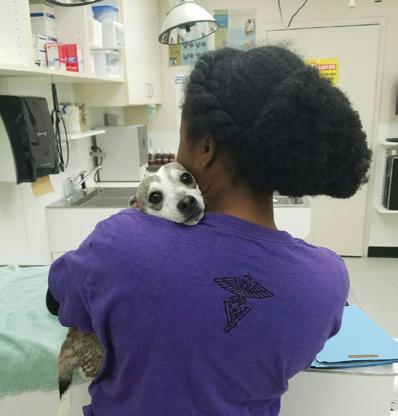
Tracy Rothstein, Animal Chaplain
By Larry MoyseWhena Cocker Spaniel named Dusty came into the life of 14-year-old Tracy Rothstein, his life changed forever as his love for animals, particularly dogs, began to flourish.
Blending That Love With Faith
An ordained animal chaplain, Tracy earned his Ministry certificate and was ordained in 2012 after two years of studies and instruction from Emerson Theological Institute in California. When Tracy graduated, there were only six animal chaplains in the country. None in Arizona. Some clergy deal with grief only. Some run their ministry on line. And for others, animal shelters are a source of their care.
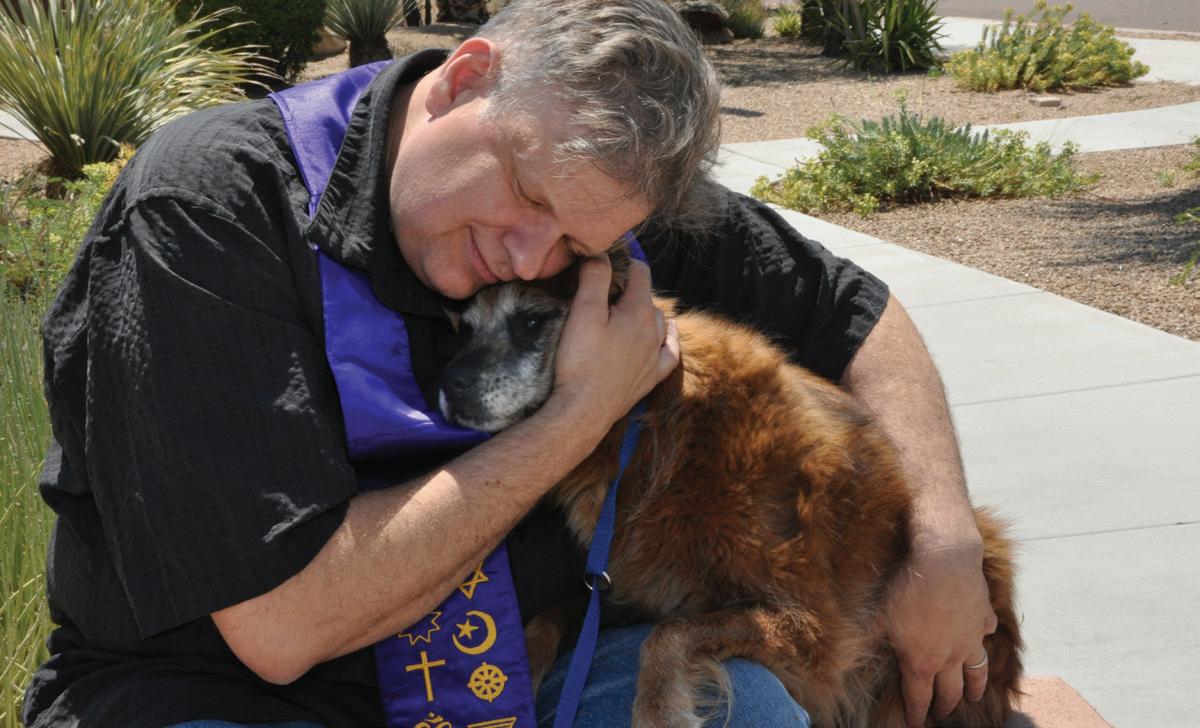
In addition to performing his job as Director of Operations at Pal’s Inn Pet Resort in Fountain Hills, Arizona (a facility that cares for boarder guests and rescues), Tracy also provides a unique service to address the spiritual needs of Pal’s customers.

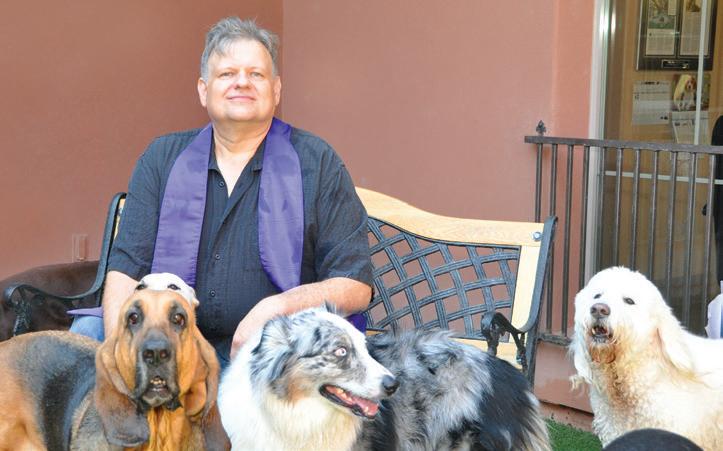
Officiating as One Spirit Animal Ministry along with his mother, also an ordained minister, Tracy provides spiritual support for animals and their families and provides grief counseling for the family and friends who Tracy says, “need to take their time to work through their grief.”
When asked what the ministry means to him, he stated, “I just want to make a difference in the lives of people and animals. If by my work, I can help someone through grief, or help (by blessings and prayers) comfort a pet, then I have done my soul’s work.”
Tracy believes that “the spirit of God is in all living things”—from snakes to spiders and, of course, dogs and cats.
The Power of Prayer
Sometimes Tracy will pray with an animal, or together with the family, for an extended period of time. This includes the “siblings” of the deceased. Tracy realizes that not only humans, but also the four-legged creatures
associated with the departed, are in need of counseling since they grieve as well.

Tracy once prayed with one of his injured pets and provided pain medication to ease the animal’s suffering. The pet “bounced back,” full of energy and happy as he had ever been. Could it have been the prayer, the pain medication, or a combination of both? Tracy’s response—simply “Yes.”
Remembrance Ceremonies
When it comes to mortality, Tracy officiates animal memorial services. Most funerals, or animal remembrance ceremonies as they are called, follow cremation. Depending on the wishes of the family, the cremains are either buried or turned over to the next of kin. A memorial ceremony can be a meaningful way to reflect upon, celebrate, and pay tribute to those very special relationships.
The Affable and Mild-Mannered Man
On the home front, Tracy has six dogs, one foster, two cats and a ferret, all who keep him and his wife Jennifer very busy. An occasional visit
by one of them to work with Tracy is not uncommon. “They are my family,” he says.
A recent visit to Pal’s Inn found me following Tracy through the dog kennel area where the boys and girls went crazy barking and jumping— probably because I was with him.
When Tracy goes into the kennel area by himself, the animals tend to be more quiet and tranquil.
Hmmm…

Tracy has no fees for his services, but will accept donations. “It is not my work,” he says, “but God’s.”
His motto? “Saving a dog may not change the world, but that dog’s world will be forever changed.”
Amen Tracy. Amen.
Tracy Rothstein
480-837-0069
palsinnpetresort.com




“Saving a dog may not change the world, but that dog’s world will be forever changed.”Larry Moyse
NEVER CAN SAY GOODBYE
Host of Ways to Memorialize Your Beloved Pet
 By Joyce Becker Lee
By Joyce Becker Lee
Weall know when we acquire a pet that at some point we will probably be faced with losing our friend, whether to age, infirmity, or tragic accident. It’s something we must deal with to enjoy that unconditional love and companionship. But saying goodbye to your pet doesn’t mean saying goodbye to the memories. Here are some ideas to help keep your pet alive in your heart and for consideration when a friend has a loss. Included are some that are simple and some more unusual—from the gentle to the eco-friendly to the startlingly futuristic, along with some informational websites.
Simple and easy

• Arrange a memorial service where friends and relatives can talk about your pet.

• Help your children create a memory box or display featuring your pet’s photograph and inked paw print, along with their favorite toy and collar.
• Create a garden step stone adorned with your pet’s name, or create a classic plaster paw cast (Instructions and kits online).
• At any photo lab, have your favorite photos of your pet transferred onto a cozy blanket that will keep your memories warm,
• Use your pet’s dish for a lovely window garden.
A little more unusual
• Order a custom-made stuffed animal that replicates your pup (cuddleclones.com or mypetsies.com).

• Sew a comforting pillow stuffed with your pet’s fur clippings.
• Have your pet’s hair spun into yarn to create a knitted garment. (knityourdog.com).
• Honor a hunting dog by filling bullets with cremains for a bang-up farewell.
If you choose cremation
• Select a beautiful urn to hold your pet’s cremains.
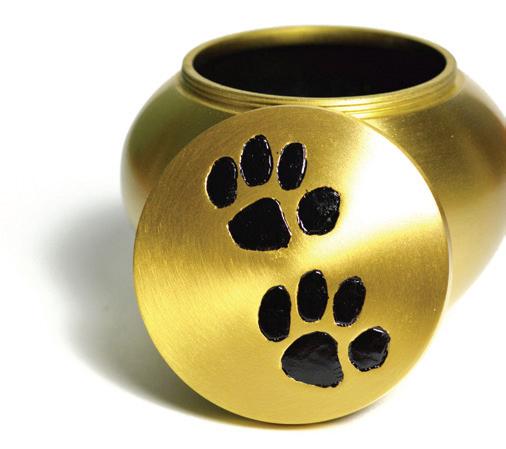
• Choose a necklace that can hold cremains or a lock of fur, complete with your pet’s picture laser-engraved on it.
• Repurpose your dog’s collar into a bracelet or necklace, complete with tags.
• Have a whimsical necklace made from a mold of your pet’s nose (for living dogs, too) (uncommongoods.com, preciousmetalprints.com).
• Ask local glass artists to infuse art glass such as a paperweight, pendant or touchstone with your pet’s ashes (artfulashes.com, rainbowbridgehearts.com).
• Commission a portrait of your pet—many artists will mix ashes into the paint.
• Go a little further by getting a tattoo with your pet’s ashes mixed into the ink.
Environmentally thoughtful
• Plant a tree and include a memorial plaque or stone.
• Let your pet himself go on living as a tree, using his
ashes as a potting medium in a specially-designed urn (urnabios.com, thelivingurn.com).
• Have the cremains turned into an Eternal Reef, (around $4,000 to $7,500), combining burial at sea with an eco-friendly memorial (eternalreefs.com).
Above and beyond (and a little fantastic)
• A UK company will create a record (your choice of song) with your pet’s ashes by pressing them into the vinyl. Cost: ±$4,300 USD (andvinyly.com).
• Freeze-dry your pet to keep with you virtually forever. This isn’t taxidermy—your pet’s body is sensitively posed and frozen over a long period to draw out all the moisture and prevent decay (perpetualpet.net, allcrittersandpetsfreezedry.com).
• Have your pet’s ashes pressed into a diamond you can then mount in a jewelry setting for a brilliant forever memory (lifegem.com).
• Your pet’s ashes can be part of a fireworks display, available in the UK or Australia.Prices $1,200 to $5,000+ USD (heavenlystarsfireworks.com, heavensabovefireworks.com).
• Give your pet an out-of-this-world sendoff— literally—with a space launch, an orbit with a




“shooting star” reentry, or a moon landing ($1,295 to $12,000) (celestis.com, elysiumspace.com).

• Cloning your pet is expensive (±$50,000), but you could even create a whole litter of your favorite pup (viagenpets.com).
Perhaps the most meaningful thing you can do is to donate to a local shelter in your pet’s name and take comfort in knowing that her life will impact so many more. Even better, become a shelter volunteer and get your puppy fix by helping other dogs. Who knows, you might even find a new canine companion to help fill that hole in your heart.
Avoiding Holiday Hazards
By Penny LexManypeople delight in sharing festivities with their pets, but the elements of some holiday activities can pose dangers to their companions. Over the Summer, it’s Fourth of July and fireworks. Then Halloween and Christmas arrive with their own scary lot of potential hazards. Here are some tips to keep your pet safe and stress free during the holiday hoopla.
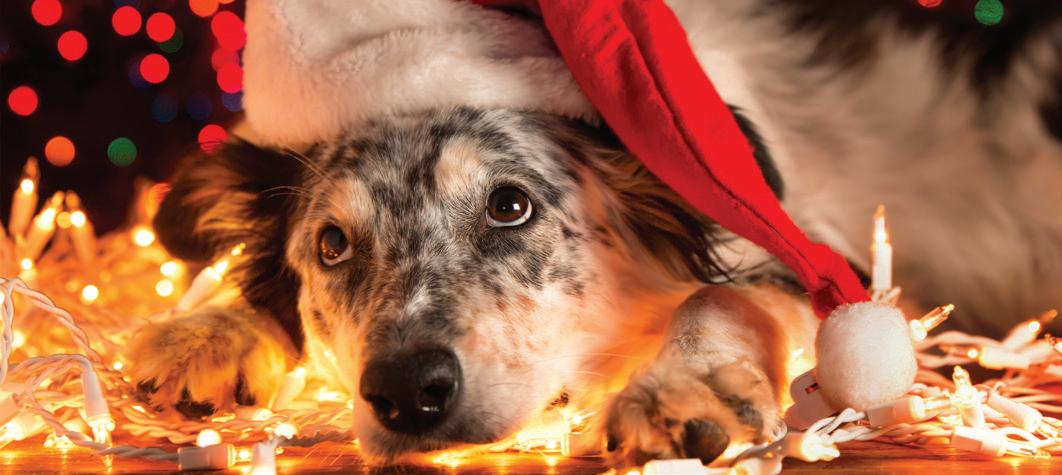
Remind everyone in your home to keep candy and treats out of the reach of pets. Some goodies may be toxic to animals, including chocolate and some artificial sweeteners. Watch out for wrappers. Discarded candy wrappers and sticks from lollies can cause choking, obstructed airways, and internal blockages. Make sure they’re not accessible even after they’ve been thrown away (in an open-top wastebasket, for example).
Take precaution so your pet doesn’t dash out the door when opening frequently for trick-or-treaters or when guests arrive. Use a baby gate or confine your pet to another room.
Even a pet that is used to an occasionally ringing doorbell might react differently or become stressed when there’s someone at the door every few minutes.
Beware of glow sticks and glow jewelry. They are foul tasting and may cause GI upset.

Even if they know the person, pets can be frightened by people in costumes and may not react normally. For example, while Barney the Boxer might be best friends with little Suzy from down the street, he might growl or be frightened when Suzy comes to the door dressed as a zombie.
Animals in garments can be cute, but be aware of safety issues. Don’t leave your dressed-up pet unattended. Accidents can easily happen by tripping, choking, or getting clothing caught on something.
Try on costumes or clothing ahead of time so your pet can get used to the feel and fit. Make sure he can easily move, see, and hear. Watch for possible allergic reactions to fabrics and accessories as well. If your pet is obviously uncomfortable or afraid, don’t force him to wear the garment.
Watch out for jack-o-lanterns, candle flames, swishing tails, and the potential for fire and burns.
If trick-or-treating with the family, be sure your pet dons reflective gear and always wears an i.d.
Keep holly, mistletoe, and poinsettia plants out of pets’ reach. They are poisonous.
Christmas tree water can be dangerous due to preservatives, pesticides, and fertilizers. Use a covered tree water dish.
Holiday trash offers an added allure with a larger volume of candy wrappers, remnants of desserts, bones from turkey, and other fare—all of which can cause serious health problems.
Assess for stress. Keep your pets where they are most comfortable. If they’re not used to being around children or guests, don’t force them to engage. If Scruffy appears to be scared, uncomfortable, or anxious, put him in a safe, tranquil environment until the activities subside.
Make sure to educate children so they’re aware of your pet’s safety needs, too.
SUMMER SPLASH RATES
start at $6000
(restrictions & charges apply)
& Suites - Fountain Hills / North Scottsdale
Monthy extended stay rates start at
$999 per month (April-September)
Free Wi-Fi
On-Site Restaurant
Bar

Fitness Center
Guest Laundry
Meeting Space
Weekly Maid Service
Natural beauty, striking views, and beautiful desert terrain await you at Lexington Hotel and Suites Fountain Hills-North Scottsdale. All guest rooms include microwaves, mini-fridges, coffeemakers, hairdryers, iron, ironing board, and 32-inch flat panel cable TVs with HBO and ESPN. Take advantage of our extremely
Pool & Jacuzzi
Cable TV with HBO
Outdoor Plug-Ins
Pets Welcome
comfortable beds and relax while enjoying year-round savings with our Kids Stay Free Policy (11 and under in parent’s room). Special weekly and monthly rates for long term, corporate assignments or business trips as well as direct billing options. For your convenience our hotel is a 100 percent smoke-free property.

Lexington Hotel & Suites - Fountain Hills / North Scottsdale

12800 North Saguaro Boulevard • Fountain Hills, AZ 85268 602-810-7447 • LexingtonHotel.Net

EXPANDING YOUR PACK
Introducing a new member to the brood
By Joyce Becker LeeThere are many reasons people opt for more than one dog: blended families might include multiple dogs; an owner with a long work day wants to provide Bowser with company; and finally, one dog is great, so two or more must be even more so. While experts vary on exactly how to introduce a new dog, all agree that it’s most important to do it gradually.
Getting Acquainted
Just because your dogs get along doesn’t mean they should be allowed free rein in playing, especially in the early stages of companionship. Don’t leave them alone while you are gone for long periods; monitor playtime and stop to separate them if the play gets too rough.
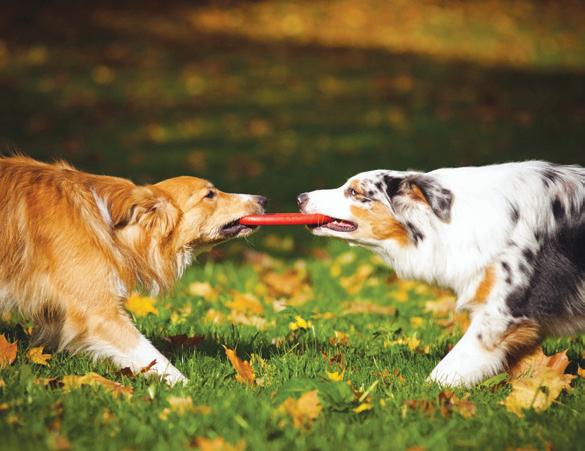
Be Sensitive to the Needs of Both Dogs
• Care: If you are a single person, all the chores will fall to you, including extra walks and increased cleaning.
• Compatibility: Mesh personalities—while a calmer, older dog could be a good influence on an active pup, a slightly more active addition might be just what your old guy needs to up his exercise. And two high-strung dogs might fuel each other’s excitability. Experts agree that dogs of opposite genders have an easier time acclimating to each other, but be sure both are spayed and neutered.
• Cost: Consider the additional costs of food, accessories, vet bills, training, grooming, and other expenses, as well as multiple fees for doggy day care or walkers. Travel can also be a challenge with more than one dog: you’ll have higher boarding or pet sitting costs. There may be extra fees for plane fares and dog-friendly hotels.
• Laws: Remember to check the legal pet limit ordinances for your area.





ADDITIONAL BENEFITS OF MULTIPLE MUTTS
Avoid feeding problems by maintaining separate bowls set far apart, making sure each dog learns to respect the other’s dish. If you see any suggestion of aggression, feed the new dog in a separate room.


Give
One school of thought is that dogs should meet first by scent only. Keep the dogs out of sight of each other; then introduce each to the other’s toys or blankets to become familiarized to the other’s scent. Let the new dog walk around the house to get used to the smells while leaving his own scent. Then let your first dog do the same alone. If either exhibit marking behavior, quash it right away.
Finally, take both dogs to a neutral enclosed area, such as a dog park, and allow them to meet face to face. Since they are already familiar with each other’s scent, there should be no drama. Keep the meetings short and supervised until you are confident they can get along together. A second school of thought allows the dogs to meet right away, but separately, preferably on a long walk. This requires two people, one for each dog. Have the person with the original dog walk in front. After a while, give them time to sniff each other; then resume the walk. Let them have greeting time outside, then inside the house. Limit their time together, gradually increasing it as their comfort grows. Give them time to adjust to each other and establish their own hierarchy. Until you know how your dogs will get along, keep them separated while you are gone.
Establish a separate sleeping area for the new dog, and be aware of territorialism.

If your first dog has established special comfort areas, be aware of any negative reaction to the other dog approaching that space.
While you want your dogs to bond and get along, they should understand that you are the pack leader. Establish your bond with your first pet before adding another. If your dogs understand that you are dominant, discipline and training will be much easier. Gradually make it clear that you welcome both dogs to cuddle and play with you…but be sure to give each one special, one-on-one time too. Help your first dog understand that he is not being replaced, and let the second know he is welcome and loved.
Factors To Consider Before Adding Another Dog
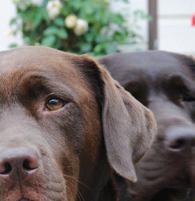
• Age: If your dogs are the same age, you will have the burden of double the age-related problems and medical issues, and the wrenching possibility of losing both within a short time.
The National Center for Health Research suggests that children raised in homes with dogs have fewer pet allergies, while The Journal of the American Medical Association (JAMA) notes in a Scientific American article that children who have been around two or more dogs in the first year of life are significantly less likely to develop sensitivities, not only to animals but also to other allergens, such as mold and pollen.

THIS ‘N THAT





Quick & Easy Pumpkin Biscuit Treats
1 egg, beaten
1/2 c. pumpkin (canned)

1 t. baking soda
1/4 c. water or low-sodium meat broth

1/2 c. rolled oats
1 1/2 c. flour

1. Preheat oven to 350°.
2. Mix all ingredients well.
3. Drop by tablespoon onto parchment-lined or lightly greased cookie sheet.



ARIZONA DOES
ROCK






Earthquake Preparedness for You and Your Pet
By C.J. AndersonWhenArizona residents are asked about the disasters that they are at risk from, almost 100 percent get the hazards of wildfires, flooding, and hurricanes right. About 50 percent get the added hazard of chemical accidents accurate. And less than 1 percent get the last one— earthquakes.

Why the Risk
We learned from the Joshua Tree, California, 7.0 earthquake in October 1999, that the Phoenix area would also be affected. We experienced swinging chandeliers, water sloshing out of swimming pools, and a broken water line at Arizona State University. That was when earthquake specialists realized that granite absorbs earthquake energy and there is almost no granite between Phoenix and L.A. so, liquefaction occurs when houses are built on sand. Many Arizonians do not realize the number of wells that are built in their city: gisweb2.azwater.gov/WellReg
Prepare. Prepare. Prepare.
Be sure your pets are identified:
• Have collar tags. Your two fingers should fit underneath the collar to make sure it fits well and won’t slip off.
• Microchip your pet and check that your information is registered and up-to-date.
• Consider tattooing your phone number on your pet to expedite contact.

• Have a GPS-enabled tag attached to the collar. An earthquake is the disaster for which you’ll most want to have a go “bag.” Fill it with water, medication, spare leashes, and pet food. Also, have a carrier ready to go. Make sure that you place pictures of yourself with your pets on Google docs, or some other online feature, so they will be accessible from another computer or your smart phone. This can be critical for identification if your documentation becomes lost. It can also be a great
resource of medical information if your pet is undergoing medical care or needs medication.
In the event you are trapped, access to additional supplies may be nil. You may have to remain where you are until you are evacuated. If your beloved pet is within reach during an earthquake, allow them to seek safety rather than risk getting scratched or bitten as a result of their terror.
Tax deductible adoption donations for dogs range from $150–250, depending on the age and breed of the dog, and $50–100 for cats and kittens. All adoptions include spay or neuter, age appropriate vaccinations, and microchips for dogs.
“Our rescue is unique in that we put a great deal of effort into placing animals into a home that matches their unique situation, personality, and traits,” says Melanie. “We truly attempt to find that perfect fit between adopter and animal, with an emphasis being placed on matching an adopter’s desires with an animal’s specific requirements for a happy, permanent home.”
The average daily census of WWW rescues varies depending on the season but ranges between 40–60 dogs and cats with an annual adoption figure of around 400 animals.
See the entire map: cefns.nau.edu/Orgs/ aeic/eq_fault_maps.html
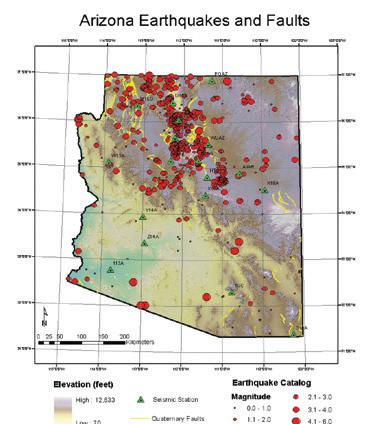


“The Pets Evacuation and Transportation Standards Act of 2006” requires that emergency authorities take pets when they evacuate you. Once they remove you to safety, the law becomes much grayer regarding what they do for your pet. At the Cedar Creek wildfire, if you did not have a carrier for your animal, Emergency Management would not keep them. The more you prepare to meet your pets’ needs, the more likely Emergency Services will take them in so they are safe.
“The most important preparation you can make is to understand how you would be affected by an earthquake so that you can reduce the element of being paralyzed by shock.”

Get Involved
Participate in drill exercises for preparedness decisions like the October 19th Great Arizona ShakeOut. shakeout. org/arizona
Help in your community by joining Arizona Disaster Meetup for Animals. meetup.com/preview/AnimalEmergency-Response-Arizona
Learn OSHA requirements for emergency response plans and evacuations for your rescue or pet business by registering at the Arizona Disaster Meetup for Animals to be notified about free webinars on this subject.
C.J. Anderson is President/CEO of Animals in Disaster, Empty Bowl Pet Food Pantry, service provider for the Arizona Veterans Stand Down, Director for the Animal Medical Reserve Corp. of Arizona State Health Disaster, and works tirelessly throughout Arizona to help keep pets in their homes during crisis.
WOOFS, WIGGLES N WAGS ANIMAL RESCUE
 By Penny Lex
By Penny Lex
Having worked for several years as a volunteer for local rescues, Melanie Murphy responded to her desire to rescue dogs and cats of all breeds in need of good homes and founded Woofs, Wiggles N Wags (WWW) in 2012. The 501(c)(3) charitable organization is incorporated in the State of Arizona and operates as a private shelter to help all homeless animals within the state. The rescue accepts animals from most counties and adopts into homes, as appropriate.
The Mission And Process
The mission of WWW is to provide temporary shelter to surrendered, abandoned, and stray animals; find suitable permanent homes; and to provide assistance and financial aid to reduce overpopulation through spay and neuter programs.
Primarily foster-based, WWW animals live in foster homes during the week and are transported to adoption events on weekends. “Our adoption process is designed to benefit our animals by placing them into suitable permanent homes based on the individual characteristics of all parties,” Melanie explains. “All potential adopters are evaluated by interview with our staff and require an application and agreement which clearly describe the responsibilities of adopting a new pet.”
A group of approximately 18–20 volunteers assist in every facet of WWW operations. Because their availability is based on individual schedules, WWW always welcomes additional volunteers with a passion for helping. Immediate needs center on volunteers who can help with transportation of animals on weekends to attend adoption activities and monetary donations to help them meet the expenses incurred for housing, food, cleaning, maintenance, and medical treatment.
Planning A Capital Campaign For Growth
“Our rescue continues to grow and we are dedicated to expanding our operations to help more homeless animals in our community,” says Melanie. “To fulfill this goal, we have committed to building a permanent facility to house most of our animals and to provide a central location for adoption events. In addition, we will provide on-site specialty medical care for those animals in need prior to adoption.”
“We are in the early planning stages of this major capital campaign and would appreciate help in the design, formal planning, building, and financial support needed to make this a reality!” 4848
wiggles n wags
“We truly attempt to find that perfect fit between adopter and animal”
BOOK REVIEWS
Reviewed by Terri Schlichenmeyer, The Bookworm SezFinding Gobi: The true story of a little dog and an incredible journey by Dion Leonard
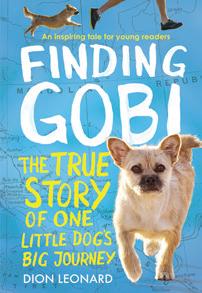
Sometimes, it’s fun to just run.
It’s fun to get your legs pumping, to pound feet on pavement, and pump your arms until your head clears. The faster you go, the better it gets and that can make you feel really happy. And, as in the new book, Finding Gobi by Dion Leonard, if you’re lucky, it can also make you a new best friend.
Dion Leonard loved to run. Unfortunately, he didn’t feel like he was good at it anymore. Not long ago, he’d hurt his leg and, much as he wanted to get back into marathon running, it wasn’t easy. Still, he’d signed up to run 70 miles through China. Maybe that old joy would return.
And then Dion saw the dog. She was kind of scruffy, with a funny-looking tail and hair around her nose that made her look like she had a beard. He patted her and sent her off, but when the race started, she started running right next to him! Dion didn’t give the dog much thought, but she paced him and that night at runners’ camp she curled up next to him in his tent.
The next day, the little dog ran alongside Dion, up rocks and across sand. She never got tired, and he started to like having this
WAG’S CROSSWORD PUZZLE
Human Foods Safe For Dogs To Eat
companion on the marathon. At the end of the day, he made arrangements to get her across the most dangerous part of the race; those little paws simply wouldn’t be able to make it across the Gobi Desert.
Gobi. There. The dog had a name.
By the end of the marathon, in which Dion did exceptionally well, he had fallen in love with the little brown dog and vowed to take her home to Scotland with him. That, he quickly learned, was easier said than done.
There was yards of paperwork, all kinds of tests, quarantine, and several airplane rides—but those weren’t the hardest parts.
Someone, it seemed, wanted to make a profit off Dion’s quest to bring his dog home. And others didn’t want his dog around at all.
Who can resist a tale of determination against all odds, cost, and logistics, especially when it comes to the love of a dog?
Author Dion Leonard writes subtly of his own issues at the beginning of the race, of a non-dog-loving culture, and of fame that turns strangely threatening.
Because of your love for your dog, you’ll “get” this book. Make a run for it.
Barkus by Patricia MacLachlanRemember when your best friend stepped into your life?
Was it this year or last when she approached you on the playground? Did you see her in the neighborhood, or somewhere else? Or maybe it happened like it did for Nicky. In Barkus by Patricia MacLachlan, illustrated by Marc Boutavant, her BFF walked in on a leash.
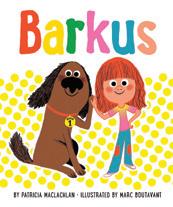
Uncle Everton was Nicky’s favorite uncle. He was always full of surprises, so when he told her that he had a present for her, Nicky knew it would be something good. It was—and it was something BIG, too. Her surprise was a huge, brown, furry, swishy-tailed dog named Barkus.
Uncle Everton said Barkus was the “smartest dog in the whole world.” Barkus could sit and whirl and shake hands. He hardly barked, and he never bit anybody. Nicky loved Barkus immediately.
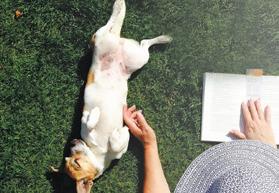
Barkus loved Nicky, too, but he was a bit of “a sneak.” One day, he followed her to school and, because he was smart enough to sit quietly and help with lessons, Mrs. Gregolian said he could stay.

On another day, Uncle Everton sent a package. When Nicky opened it, she got another big surprise: the package held a present for Barkus because it was his birthday!
Having a big furry dog was great, but Nicky still grew bored sometimes. Even Barkus needed “something new and exciting.” So when he came home one day, carrying a tiny object carefully in his mouth, Nicky knew he’d found something that would make their summer even better. It would mean less room in their tent when camping. It would mean different snacks at snack-time. It would mean a whole new part to the Nicky and Barkus story because Barkus found a baby! A small, furry baby, but not the kind of baby you might think a big, furry dog would love.
For animal-loving boys and girls who are just starting to tackle chapter books, author Patricia MacLachlan and illustrator Marc Boutavant present them with a slight challenge that kids can really sink their teeth into. The title character is a big, goofy mutt with brains and has adventures that are mischievous but not malicious. Nicky is Barkus’ perfect companion and the narrator of this tale. She’s responsible, happy, eager for fun, and the sort of kid anyone would want for a friend.
This book contains no drama. There’s no edginess to it and no lessons to be learned here. It’s pure entertainment—a great holiday gift for kids 7– to 10-years-old.
Be mindful of seeds (some are toxic), pits, bones and food allergies. See akc.org/content/health/articles/human-foods-dogs-can-and-cant-eat/ for additional information.
P Z Y O R W Y D X M B S G G D D M Q V W X
E N Y R S L N M J J A G L T M K Q J A T T
A B Y A Y T P V T E Y D D L Y X B T R M Z
N L X N L N U I P L P V L L Q V E M N M S
U L J G N J S N N D J L R L D R R J A T T
T S G E Z X M E A E R L L K M P W Q O H K
B Q E S P S T T I E A Z T E T L K R B T P
U J P I B Y E A R R P P L Q P P R X R E R
T T U S R R I O P L R O P Y L A R H A Z Y
T S O N Y R U L T P N E S L C N J C S J G
E E L A J N E S O A L N B A E S H L R I S
R I A E M N L B S C T E V P N E A W Y E F
Y R T B L N N B W E C O S S S A D L I R Z
E R N N J L Y T R A L O P R W A N R M N B
K E A E A O N I U Q R S R T B E R A J O N
R B C E N R O C P O P T P B E E H G B Y N
U E Y R M M N T E J K Z S R B E G S X Z R
T U Z G N Y Y M A T B Y X N O W W G A P K
X L T N J Q B L R K P Y A N Z U L S S C M
W B D T X M Y Q S Q M R M X T R T V K D V
G L L M B D T N M N C B T R T Y R S R M L
Pears
Peanuts
Cantaloupe
Peas
Apples
Fish
Oranges
See answers on page 30
Quinoa
Bananas
Watermelon
Pineapple
Strawberries
Turkey Eggs
Blueberries
Raspberries
Broccoli
Ham

Carrots
Sweet Potatoes
Brussel Sprouts
Green Beans

Cranberries
Peanut Butter
Peaches
Cashews
Popcorn
Salmon
Goodbye, Buddy.
By Joyce Becker LeeOna farm, a dog is usually a worker, a peer rather than a pet. When our dogs died, we buried them without fanfare in the woods and briefly mourned before moving on to the next batch of a neighbor’s puppies.

So I was hardly prepared for Buddy.
At 92, my dad was confined to a wheelchair, homebound most of the time. His friends had passed on, and though I lived next door, I worked all day, and he was lonely. Then my friend returned from her stepfather’s funeral with a fat, eight-year-old Cocker Spaniel with limpid eyes and shiny buff fur.
“Do you think your dad would like Buddy?” she asked. Dad never allowed a dog in the house, so I was skeptical, but Dad surprised me. He took one look at the fat, docile dog and said, “Okay.” In response, Buddy crawled under Dad’s wheelchair, moving when Dad moved.
Buddy had lived in a mobile home, only allowed outside on a short chain to do his business; and this lack of exercise was evident in his excess 20 pounds. When outside, he would survey the vast yard, never moving off the porch. Then one day he took off running, nose to the ground, fat little body wriggling with delight. Our veterinarian figured that living in a smoking environment had led to Buddy’s degraded sense of smell and a heart condition. A month in the country opened his nose to a world of wonderful scents. I wept for the dog’s obvious joy.
I can’t imagine how difficult his first years were, cramped and confined, even physically abused. Yet he was still willing and able to forgive, to trust, and to love.
On our daily walks, he stuck close to my father’s chair
as I pushed him along. The pair shared a sweet but doomed camaraderie: that Thanksgiving weekend would be my father’s last. When the paramedics arrived, Buddy leapt onto the bed, straddling his master, daring anyone to harm him. That moment of selfless devotion earned him his place with me.
My husband was working in another state, so Buddy became my companion. We exercised religiously and as his vitality improved, the weight fell off. For the next five years he provided friendship when I was lonely, sympathy when I was laid off from work, and familiarity when I moved from my lifelong home.
He wriggled with joy and made me smile; he forced me get out every day when I just wanted to curl up and sleep. His body beside me on the bed was pure comfort, his gratitude for every cuddle soothing. He loved me unconditionally, the way children love you before they grow into the larger world for which you prepared them—and to which you lose them.
Then my husband unexpectedly died.
Buddy seemed to understand. At 13, with his health failing, he seemed determined to get me through the worst year of my life. Finally, just breathing took effort. Yet, even in his last hours, as he sat weakly stretching into the morning breeze, he had a smile of acceptance and contentment.
He died precisely one year after my husband’s death.
On a perfect fall day, I carried his ashes to our dog park and sprinkled the remains gently along his favorite wooded path. Then, though there was no breeze, a soft ash cloud rose and wafted away, as though waving goodbye, offering one last moment of comfort.

2nd Chance Dog Rescue
2ndchance.rescuegroups.org
Non-profit organization dedicated to saving abandoned/ abused dogs, and provide them with shelter and a safe environment so they can regain their trust in humanity.
AARTA - Akita Advocates
Relocation Team Arizona
www.akitaadvocates.com
602-882-5482
Non-profit organization that finds homes for displaced Akitas through fostering.
ADOPT ME GSD
ADOPT ME GSD Facebook page
480-720-1534
Saving German Shepherds from euthanasia, providing them with medical treatment and finding loving homes.
Alaskan Malamute Rescue of Arizona
www.malamuterescue.org
Alaskan Malamute Rescue of Arizona Facebook Page Rehabilitate and rehome rescued Alaskan Malamutes, assist Malamute owners, and provide education services to the public.
All About Animals Rescue
www.allaboutanimalsaz.com
No-kill, foster home based, rescue.
All About Bullies Rescue
All About Bullies Rescue Facebook Page
480-227-1276
Non-profit organization that saves, rehabilitates, and rehomes bully breeds. Specializing in Pit Bulls.
Almost Home Bulldog Rescue,Inc.
www.almosthomebulldogrescue.org
480-227-1276
Non-profit organization based in the Maricopa County area of central Arizona. We are dedicated to the rescue of un-wanted, neglected, and abandoned companion animals. Our focus is French and English Bulldogs from local euthanasia lists.
Amazing Aussies Lethal White Rescue of Arizona
www.amazingaussies.com
602-571-5811
Non-profit organization that rescues dogs bred Merle to Merle and born blind and/or deaf by a cruel and inhumane breeding practice, so the breeders can make a few extra bucks. About 25% of every litter will come out “wrong” and are killed at birth or thrown away since they can’t be sold. It’s just a “cost of business” to the breeders, but it’s an everyday fight for us. hope you will join us to help end this planned cruelty.
Animal Rescue Friends Ltd
www.animalrescuefriends.org
623-428-9119
Non-profit foster-based rescue that provides love and care for the rescued animals in a home environment. Utilizing fosters allows us to provide attention to each animals’ unique needs while also training them on how to be inside a home.
Anthem Pets
www.anthempets.org
480-287-3542
Non-profi 100% volunteer, No Kill rescue to implement a fully rounded animal welfare program that provides education and resources to the community at large and promotes responsible pet ownership. Volunteers answer calls at the 24 Hour Pet Hotline; provide medical care for abandoned and abused animals and find them qualified, loving homes; and work to reunite lost pets with their owners through use of the Pet Hotline, a Pet Search & Rescue team and a very active Facebook page
Arizona Animal Welfare League and SPCA
www.aawl.org
602-273-6852
Largest and oldest no-kill shelter in Arizona rehabilitates and rehomes more than 5,000 dogs and cats that are abandoned or that have been surrendered by their owners. We do this primarily by rescuing them from other shelters in Maricopa County where they are likely to be euthanized due to the lack of time and resources to care for them. At any one time our shelter will hold 140 cats and 190 dogs. We also have a foster parent network of approximately 90 families who provide care and shelter in their homes for puppies and kittens that are too young to be adopted, and those animals that are recovering from medical procedures or that need socialization before adoption.
Arizona Basset Hound Rescue Inc
www.azbassetrescue.org
602-225-7800 (voice mail)
Non-profi organization that provides veterinary care, food, support, and shelter to Basset Hounds, Bloodhounds and Basset Hound mixes needing assistance in Arizona.
Arizona Beagle Rescue
www.azbeaglerescue.com
623-977-1355
A statewide 501(c)(3) non-profit animal welfare organization comprised of volunteers dedicated to Beagle rescue and community education.
Arizona Border Collie Rescue www.azbcr.org
480-422-5366 (voice message)
Promotes humane treatment through rescue, rehabilitation, education and the rehoming of neglected, abandoned and unwanted Border Collies
Arizona Boston Terrier Rescue
www.azbtrescue.org
Non-profi corporation dedicated to the rescue and rehoming of unwanted Boston Terriers, education of owners on responsible dog ownership, and education of the public on the Boston Terrier breed.
Arizona Golden Rescue
www.arizonagoldenrescue.org
623-566-9247
Provides emotional and medical rehabilitation and will pay for all medications and for necessary surgeries prior to adoptions being finalized for Golden Retrievers and mostlyGolden mixes.
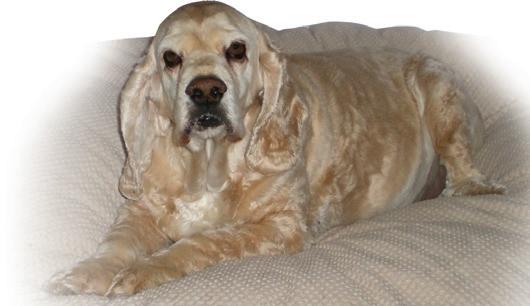
Arizona Humane Society
Two locations: Sunnyslope Campus and Nina Mason Pulliam Campus for Compassion www.azhumane.org
602-997-7585
Pet adoptions, veterinary and spay/neuter services, retail and thrift shopping.
Arizona Labrador and Giant Breed Rescue
www.azlabsandgiants.org
602-307-5227
Volunteer non-profit organization that is dedicated to rehoming Labradors, Great Danes, Mastiffs, Elkhounds, Newfoundlands, Bernese Mountain Dogs, Saint Bernards, Irish Wolfhounds and Deer Hounds.
Arizona Pug Adoption & Rescue Network
www.aparn.org
480-964-3126
Non-profit to rescue Pugs in need, provide medical care and emotional support, and place them into loving, permanent adoptive homes in Arizona.
Arizona Sheltie Rescue, Inc.
www.azsheltierescue.com
Bill Ferrell: bkferrell@cox.net
(480) 507-7996
Cindy Reel: reelracer@aol.com (602) 843-8073

Non-profit volunteer organization that serves the entire state of Arizona with respect to the rescue of Shetland Sheepdogs.
Arizona Siberian Husky Rescue & Adoption, Inc.

www.ashra.org
602-427-7226
Non-profit, volunteer-run organization that rescues Siberian Huskies and places them into qualified homes, as well as educates the public on the special needs of the Siberian Husky.
Arizona Small Dog Rescue
www.azsmalldog.org
602-944-2440
A non-profit registered 501(c)3 no kill rescue shelter. A group of volunteers that are dedicated to rescuing and saving homeless, unwanted, abandoned, neglected, and abused dogs.
AZ Cavalier Rescue
AZ Cavalier Rescue Facebook Page 602-397-4744
Foster run rescue for Cavaliers, English Toy Spaniels and mixes.
AZ Cocker Rescue
www.azcockerrescue.org
602-757-8225
Non-profit that focuses on rescuing all breeds of dogs from the county shelters that are going to be euthanized.
AZ Furry Friends Rescue Foundation
www.azfurryfriends.org
602-882-9535
Non-profit foster-based, all breed, dog and cat rescue that are at risk of euthanasia at our local kill shelters.
“he was still willing and able to forgive, to trust, and to love. ”
AZ Happy Tails Animal Rescue
www.happytailsaz.org
A non-profit registered 501(c)(3) rescue group that does not have an actual shelter. All dogs are fostered in homes. Strive to educate and raise awareness of the importance of animal respect and appreciation and facilitate a low cost spay/neuter program.
AZ Mastiff Rescue
(Canine Rescue Coalition, Inc.)
www.azmastiffrescue.com
Non-profit dedicated to rescuing English and Neapolitan Mastiffs and other Mastiff and Giant Breeds.
AZ Paws & Claws
www.azpawsandclaws.com



Non-profit 501(c)(3) charitable, all volunteer dog and cat rescue serving Arizona. Our mission is to match rescued dogs and cats with a home that will provide them with a lifetime of love and care.
AZ Shepherd Rescue
www.azshepherdrescue.org
623-256-2698
Non-profit foster-based rescue saving German Shepherds, Australian Shepherds and mixes of both from the county euthanasia list.
AZPyrs: Arizona Great Pyrenees Association & Rescue Network
www.azpyrs.com

480-988-4033
Non-profit fosters and rehomes purebred Great Pyrenees throughout the entire state of Arizona.
Boxer Luv Rescue
www.boxerluv.org
602-530-5671
A 501(c)(3) nonprofit organization to give new life to homeless Boxers in need and is 100% managed and run by volunteers and relies entirely on private donations, grants and revenue from Boxer Luv’s “Luv-To-Save” Thrift Shop.
Briard Rescue and Haven
www.briardrescue.com
602-228-2495
Established to provide a safe place for Briard dogs. The Haven is a privately run facility, funded by private donations, ebay auctions, adoption fees and bequests.
Central Arizona Animal Rescue (CAAR)
www.caaronline.org
Non-profit organization dedicated to the general welfare, sheltering and placement of animals; prevention of cruelty to animals and overpopulation; education concerning humane treatment of animals; and involvement in other animal welfare issues.
Dachshunds Only Rescue
www.dachshundsonlyrescue.com
602-550-4088
Not-for-profit, volunteer, foster-based, never-kill organization for Dachshunds. No animal is euthanized if they are too sick to be treated or too aggressive to be suitable for adoption–believe that behavioral modification techniques and positive reinforcement help to eliminate aggressive or unwanted behavior
Desert Labrador Retriever Rescue
www.dlrrphoenix.org
480-899-5227
Non-profit, all volunteer, foster-based organization that provides Labrador Retriever breed and training information on request, public education on spaying and neutering, and finding homes for the Labrador Retriever.
Desert Harbor Doberman Rescue
azdoberescue.org
602-492-8139
Arizona’s first and only 501©(3) IRS-certified charity Doberman rescue. Incorporated in Arizona, a no-kill rescue committed to forever placements, and do best to make sure the dog taken home is suited to owner lifestyle.
Desert Paws Rescue
www.desertpawsrescue.org
A non-profit, no-kill, animal rescue group to rescue, rehabilitate (when necessary) and place domestic animals into stable homes; to educate the public about the responsibilities of pet ownership; and to build public awareness about the human-animal bond and its benefits to society.
The Fetch Foundation
www.thefetchfoundation.com
602-617-2656
Non-profit dedicated to saving lives in the animal and human communities through innovative strategies and unique programs that supports, equips, and trains first responders by providing the life saving tools in“The FIDO BAG®” that is used by first responders to provide life saving intervention to family pets that are caught in a fire or other emergency situations; to provide a safe place for homeless dogs that were neglected or abused; and by connecting the right dog with a veteran in need of companionship, these K9(s) would serve a purpose beyond what anyone imagined.
Finding Fido Animal Rescue
Finding Fido Animal Rescue Facebook page
A humane rescue organization dedicated to reducing euthanasia by finding loving and permanent homes for the wonderful dogs and cats, especially the senior or special needs pets.
Foothills Animal Rescue
www.foothillsanimal.org
480-488-9890
A non-profit organization to save lives through the rescue, care and adoption of homeless animals; a thrift store remains the primary source of income and community interaction.
Four Peaks Animal Rescue
www.fourpeaksanimalrescue.org
480-471-3520
A non-profit organization dedicated to the rescue, rehabilitation, training and placement of all species of domestic animals in need of medical care and sanctuary.
Freedom Tails Rescue
www.freedomtailsrescue.com
Non-profi dedicated to rescuing animals in need.
Friends for Life Animal Rescue
www.azfriends.org
480-497-8296
Dedicated to helping the homeless and stray animals living on the streets and in the deserts. We also pursue an aggressive spay/neuter program for our animals and education for the public.
Friends of Animal Care & Control
www.azfriendsofanimals.org
602-882-8627
Reduces euthanasia in Maricopa County by supporting pets & people by providing free and accessible spay & neuter services in our community.
Great Dane Rescue of AZ Alliance
www.greatdanerescueofazalliance.com
623-869-0409
Official Great Dane Rescue group for the state of AZ and have been caring for beloved Danes throughout AZ and the valley for over 20 years. Dedicated to providing the proper care and placement of Danes in need, whether they are a pound puppy or an owner turn-in.
Halo Animal Rescue (Helping Animals Live On)
www.halorescue.org
602-971-9222
No-kill facility that provides a refuge for dogs and cats who might otherwise be destroyed for reasons such as a treatable injury, illness, or those that are too scared or too young to go up for adoption at the time of arrival. The thrift store helps to bring in necessary income.
Happy Tails Dachshund Rescue, Inc.
www.happytailsdr.org
209-647-1251
Non-profit foster-based to save as many Dachshunds from suffering and premature death
Helping Orphaned Hounds (H.O.H.)
www.helpingorphanedhounds.org
602-680-0713
Small all volunteer, no-kill, non-profit organization with two main goals: find loving homes for homeless dogs & puppies and promote spay/neuter thereby reducing the tragic consequences of pet overpopulation.
Lost Our Home Pet Rescue
www.lostourhome.org
602-445-7387
Ensure that all pets have loving homes when families face major life challenges and provide compassionate options when Realtors and the community find an abandoned pet.
Lost Paws Sterilization, Education, & Rescue
www.thelostpaws.org
623-396-8466
Non-profit organization that focuses on sterilization, education and rescue.
Lucky Dog Rescue
www.luckydogrescue.org
480-704-4628
Non-profit all volunteer foster-based organization dedicated to saving the lives of homeless animals from euthanasia, educating the community on responsible pet ownership and dedicated to training and what happens after the dog is in his new home.
Luv of Dogz Fund, Inc
www.luvofdogz.org
Non-profit that provides advocacy and resources for rescued, abandoned, homeless dogs and to the people who rescue and care for them.
M.A.I.N. (Medical Animals In Need)
www.medicalanimalsinneed.com
Volunteer-based, donor-driven organization dedicated to rescuing animals off Maricopa County euthanasia lists with a medical needs.
Mayday Pit Bull Rescue & Advocacy
www.maydaypitbullrescue.org
Non-profit volunteer and foster-based organization that focuses on rescuing, rehabilitating and securing placement for Pit Bull and Pit Bull mixes, especially with extreme medical/behavioral and special needs, and to assist dogs from dog fighting, hoarding and other crisis/emergency situations.
Mini Mighty Mutts Rescue
www.minimightymutts.com
480-304-5654
Non-profit, all volunteer, foster-based small dog rescue not limited to any breed.
Ohana Animal Rescue
www.ohanaanimalrescue.org
480-744-5729
Non-profit, foster home based organization saving euthanasia listed animals from the county shelters
One Dog (Arizona)
One Dog (Arizona) Facebook Page
Non-profit rescue site to help network e-list (euthanasia list) and rescue dogs who need forever homes or dedicated foster homes.
Racing Home Greyhound Adoption
www.racinghome.info
602-573-0940
Non-profit foster- and volunteer-based rescue to find homes for retired racing Greyhounds and other homeless Greyhounds.
R.E.S.C.U.E. (Reducing Euthanasia at Shelters through Commitment and Underlying Education)
www.azrescue.org
480-598-9410
Non-profit, volunteer-driven animal rescue with no central facility and the focus is euthanasia-list rescues of cats and dogs from the county shelters.
Rescue A Golden of Arizona (RAG of AZ)
www.golden-retriever.org
602-600-8312
Non-profit, shelterless, all volunteer organization dedicated to the rescue, evaluation and placement of Golden Retrievers who lost their homes through no fault of their own.
Rescue Pals
Rescuepals85268@gmail.com
A non-profit organization dedicated to rescuing, rehabilitating, and rehoming dogs mostly found in Fountain Hills.
Rockstar Rescue
www.rockstarrescueaz.org
858-876-2558
Our mission is to help the hard-to-adopt cases, dogs that have suffered psychological traumas either from hoarding, fighting or abandonment situations and prepare them to become loving, household pets despite what they’ve endured.
Rotten Rottie Rescue
www.rottenrottie.com
480-567-4328
Non-profit, no-kill, foster-based animal rescue to help, rescue, and rehome Rottweilers in safe adoptive and foster homes.
Sahuaro Dachshund Rescue
www.sahuarodachshundrescue.com
520-818-1323
Non-profi rescue that helps homeless Dachshunds find new homes.
Saguaro State Bull Terrier Rescue
Saguarostatebullterrierclub.com
800-282-8911
Established in 2005, small group of Bull Terrier owners dedicated to this wonderfully crazy breed. Happy to help others find a Bull Terrier, place in new home, give advice, support or encouragement when living with, showing and breeding Bull Terriers.
Saint Bernard Rescue Foundation, Inc.
www.saintrescue.org/arizona
480-951-8495
602-920-1826
Non-profi for rescue of Saint Bernards.
Saving Paws Rescue
www.savingpawsrescueaz.com
480-737-6089
Non-profit, all-volunteer organization dedicated to providing veterinary care, evaluation and adoptive homes for German Shepherd Dogs, Belgian Malinois and others who are left in pounds to await uncertain fate.
Southwest Collie Rescue
www.nmcollierescue.com
480-507-7996
Non-profit, volunteer, foster-based organization to rescue every purebred Collie in the area needing help, no matter how old or how sick.
Southwest German Shepherd Rescue
www.swgermanshepherdrescue.com
602-866-2880
10am-8pm preferably weekdays
Non-profi volunteer based organization committed to the rescue, rehab and rehoming of German Shepherds.
Underdog Rescue of Arizona
www.underdogaz.com
480-553-9311
Non-profit, foster-based dog rescue that is dedicated to rescuing and rehoming shelter dogs rescued from the euthanasia list and abandoned dogs in need.
Urban Rescues
www.urbanrescues.com
Urban Rescues Facebook Page
Rescuing dogs scheduled for euthanasia in Maricopa County animal shelters.
Valley of the Sun Dog Rescue
www.valleyofthesundogrescue.com
480-228-0126
Non-profit, no-kill, family run animal shelter with help from volunteers and fosters that specializes in American Pit Bulls and American Staffordshire Terriers, but accepts all breeds into the rescue. We strive to increase public awareness about the gentler, humane side of a “Bully” breed.
Westie & Friends AZ Rescue, Inc.
www.westieandfriendsazrescue.org
480-664-7699
Non-profi that rescues, rehabilitates and finds homes for abandoned and surrendered West Highland Terriers and their friends, educates about spaying and neutering, and stresses the need for high quality food and the importance of dental hygiene to extend their pet’s life.
White Gsd Rescue
White Gsd Rescue Facebook Page Works with Southwest German Shepherd Rescue. Woof Wiggles n Wags
www.woofswigglesnwags.com
Facebook: WoofsWigglesnWags
602-828-2425
A 501(c)(3) all-volunteer foster-based all breed dog and cat rescue. We spay/neuter, vaccinate and microchip our animals and place them in loving “furever” homes. Check our Facebook page for adoption events and special fund raiser events.
Yorkie Luv Rescue
www.yorkieluvrescue.com
Non-profi volunteer and foster-based rescue to rescue, rehab and rehome any Yorkie cross with Yorkshire Terrier that finds itself homeless and work with communities in order to stress the importance of adopting a Yorkie in the hope of one day eliminating all puppy mills
SUPPORTING ORGANIZATIONS
Empty Bowl Pet Food Pantry
www.emptybowlpetfoodpantry.org
602-909-7153
A pet food pantry and disaster services organization distributing free pet food through partner agencies and giving pet items to Veterans, homeless, disaster victims and others.
Friends of Arizona’s Shelter Animals
Friends of Arizona’s Shelter Animals Facebook Page Volunteers who take photos of and get information about animals on the euthanasia list in local shelters, volunteer time to network the animals scheduled to be euthanized and make their photos/information available to the public and rescue groups in order to find alternative outlets for them.
Pet Social Worker/Tails of Hope
www.petsocialworker.org
480-452-7997
Free online database of stray, rescued, lost and found pets in the Maricopa area. In addition, the site offers tips, instructions and links to the local Pinal County Animal Care and Control forms needed to report a lost or found pet.
Phoenix Animal Care Coalition (PACC911)
www.pacc911.org
602-992-4779
Non-profi organization that works to bring together the Maricopa County animal welfare community in an interactive manner by providing opportunities for all to work together for the greater benefit of animals. Rescued Treasure’s Charity Boutique, and Chuck Waggin’ Pet Food Pantry are divisions of PACC911.
WAGIFIEDS
Take advantage of reduced advertising rates in the Wagifieds!
CUSTOM LEATHER
Advertise your small business services or pet-related items you wish to sell. Post your ad (maximum 30 words including headline and body of text) for $75 per issue or better yet, $200 for four!
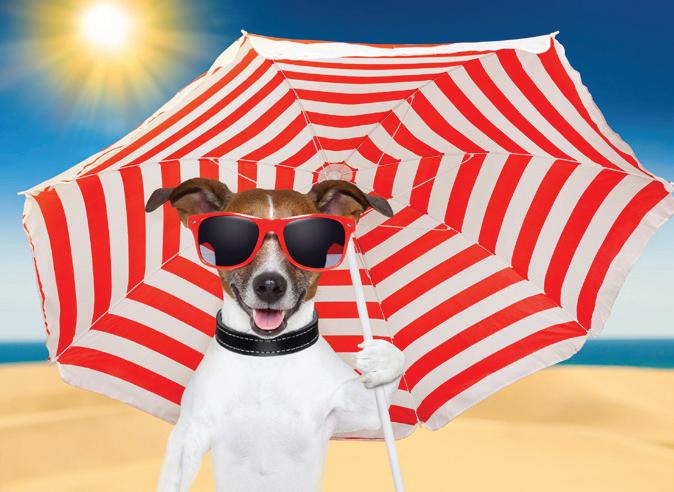


Submit your ads to: info@thewagmagazine.com
Questions: call Penny 507-202-3929
GLASS DESIGN PET SITTER





REAL ESTATE
Real Estate for Rescues

Shannon Shutack
Berkshire Hathaway Home Services





602-696-4821
WILLOW LAKE LEATHER


Grant Maves
928-227-3004 • Prescott, AZ
Handcrafted leather holsters, belts, fringe bags, guitar straps, flute pouches, dog collars and more. Call for more information.
ADVERTISE HERE
YOUR AD HERE
Do you have a product or service that other pet owner’s need? This is your ad space.
FIREFLY GLASS DESIGN etsy.com/shop/fireflyglassdesign
Handmade Fused Dichroic Glass Treasures

Personal Photos Fused on Glass Phone: 480-483- 2012 shrink60004@yahoo.com
Get

issue
Deadline December 15. 2017
In-Home Professional Pet Sitting Services
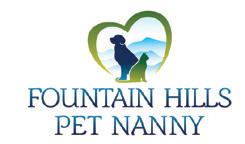





We offer daily visits, overnight stays, dog walking and house sitting services in 85268 and 85259. Bonded and insured. Call us at: 480-717-7778.
PET SERVICES
YOUR AD HERE
Do you have a product or service that other pet owner’s need? This is your ad space.
Shannon.S@bhhsaz.com shannonshutack.bhhsaz.com
Refer your friends and family! Its an easy way to help earn donations for your favorite animal charity or shelter! Call for additional details.

LOW COST AD
YOUR AD HERE
Do you have a product or service that other pet owner’s need? This is your ad space.
THE WAG - WINTER ‘18 (early January)
A SNIFF OF WHAT’S COMING ...
• hearing aids

• canine at the airport
• mobile surgical units
• U.S. Olympic skaters and their dogs


